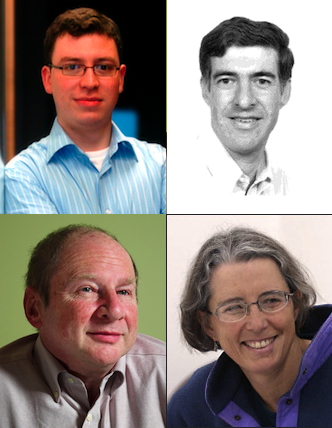 Congratulations to Luis von Ahn, Hanan Samet, Hal Abelson, and Stephanie Forrest, who today were named recipients of four prestigious awards issued by the Association for Computing Machinery (ACM). The awards, which honor the recipients for the significant contributions that they have made to enable computer science to solve real-world challenges, “reflect achievements in human-computer interaction, computer science education, geographical information science, and computer simulation for biological research.”
Congratulations to Luis von Ahn, Hanan Samet, Hal Abelson, and Stephanie Forrest, who today were named recipients of four prestigious awards issued by the Association for Computing Machinery (ACM). The awards, which honor the recipients for the significant contributions that they have made to enable computer science to solve real-world challenges, “reflect achievements in human-computer interaction, computer science education, geographical information science, and computer simulation for biological research.”
According to ACM’s press release:
Luis von Ahn, recipient of the Grace Murray Hopper Award for advances in harnessing the human side of computation to solve problems that neither humans nor computers could solve alone. Originally termed “human computation,” von Ahn’s methods employ the technique now known as crowdsourcing to tap into the collective intelligence of the public at large, enabling managers to expand their talent pools and gain insight into customer preferences… The Hopper Award recognizes the outstanding young computer professional of the year.
Hanan Samet, recipient of the Paris Kanellakis Theory and Practice Award for pioneering research on quadtrees and other multidimensional spatial data structures for sorting spatial information, as well as his well-received books, which have profoundly influenced the theory and application of these structures. These spatial data structures are commonly used in biomedical imaging, games, map (GIS) and image processing, computer graphics, visualization, and other applications… The Kanellakis Award honors specific theoretical accomplishments that significantly affect the practice of computing.
Hal Abelson, recipient of the Karl V. Karlstom Outstanding Educator Award for innovative advances in curricula designed for students pursuing different kinds of computing expertise. Abelson fostered revolutionary changes in the teaching and learning process that de-emphasized programming language specifics and concentrated on the mathematical idea of abstraction as a fundamental concept in programming… The Karlstrom Award recognizes educators who advanced new teaching methodologies; effected new curriculum development in Computer Science and Engineering; or contributed to ACM’s educational mission.
Stephanie Forrest, recipient of the ACM/AAAI Allen Newell Award for contributing new ways to address problems in computer science and biological sciences that provided new linkages between these fields. Forrest introduced ways for systems to model “self,” leading to practical methods for detecting anomalous and malicious behavior. This work expanded to encompass building “artificial immune systems” for computers and networks that simulate the behavior of natural immune systems. Her research resulted in new approaches to human vaccine design and understanding viral replication. It also led to advances in automatic software fault correction, software (re)generation, and automated diversity for attack and flaw avoidance… The Newell Award recognizes career contributions that have breadth within computer science, or that bridge computer science and other disciplines.
ACM will present the recipients with their awards at its annual Awards Banquet on June 16 in San Francisco, CA.
To learn more, and see the recipient of a fifth award announced today, see the full press release.
(Contributed by Erwin Gianchandani, CCC Director)









